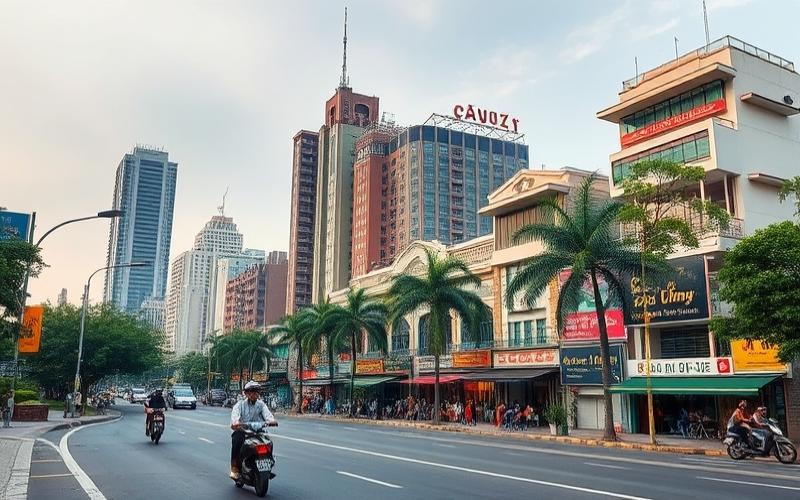
 Published on and written by Cyril Jarnias
Published on and written by Cyril Jarnias
Investing in Vietnamese Real Estate: Opportunities and Pitfalls to Avoid
Investing in Vietnamese real estate is an adventure full of promise, given the country’s booming economic expansion. However, this opportunity can quickly turn into a nightmare for those who don’t know how to navigate the complexities of the local real estate market.
Poor decisions during purchase can be costly, and frequent mistakes are often due to a lack of knowledge about local regulations and market dynamics.
By highlighting common errors, this article aims to equip potential buyers with the necessary tools to make informed purchases, minimizing risks and maximizing return on investment.
Good to Know:
The Vietnamese real estate market is growing rapidly, but it’s essential to thoroughly understand local regulations before investing.
Pitfalls to Avoid for Buyers in Vietnam
Regulatory Obstacles Faced by Foreigners
- Land ownership restrictions: In some countries, specific restrictions may apply to foreigners regarding real estate acquisition, including requirements to declare fund sources or obtain special authorization. For example, in France, there are generally no restrictions for non-residents, whether European or non-European. However, depending on the country and region (particularly outside the EU), special rules may apply regarding property use (personal use vs. rental investment), or may require establishing a local entity to purchase property.
- Tax and administrative obligations:
- Declaration of property occupancy status
- Real estate wealth tax (IFI) above certain thresholds
- Notary fees and local taxes to be paid upon acquisition
Verifying the Legitimacy of Legal Documents
- Always verify with a notary:
- The property title
- Valid construction permits
- Absence of mortgage or other encumbrances on the property
Critical importance: Acquiring property with incomplete or fraudulent documents exposes you to high risk of subsequent purchase cancellation and/or future inability to resell.
Potential Problems in New Construction
Frequent risks include:
- Structural defects not visible during a simple visit (cracked walls, poor workmanship)
- Non-compliance with recent energy standards
- Delivery delays or partial/complete absence of ten-year warranties
To limit these risks:
- Have an independent technical inspection conducted before purchase:
- Structural diagnostic
- Electrical/plumbing verification
- Permit/construction compliance check
- Require all technical reports provided by the developer
| Identified Risk | Recommended Solution |
|---|---|
| Incomplete/fraudulent permits | Thorough notarial verification |
| Hidden defects | Specialized technical inspection |
| Price fluctuations | Local market analysis & simulations |
Local Real Estate Market Fluctuations
The market may experience:
- Rapid increases that raise the final cost
- Downward corrections leading to potential loss in case of quick resale
List of factors influencing these fluctuations:
- Local/national policies on foreign investments
- Variable mortgage rates
- Regional economic volatility
It’s essential for every foreign investor:
- To analyze local historical trends
- To regularly consult various economic indicators
- To assess financial capacity against potential variations before any firm commitment
Practical Tips to Secure Your Acquisition
Essential checklist:
- Select a locally recognized real estate agent with verifiable references
- Request all professional guarantees
- Never sign without consulting an independent legal advisor
- Conduct complete financial due diligence: analyze your international banking capabilities and anticipate all additional fees related to foreign status
Systematically verifying each administrative step significantly reduces the risk associated with your international real estate investment.
Good to Know:
When purchasing real estate in Vietnam, it’s crucial for foreigners to understand regulatory obstacles, including land ownership restrictions that generally limit land acquisition. It’s imperative to verify the legitimacy of legal documents and construction permits to avoid risky investments, as irregularities in these documents can lead to legal complications. Buyers should also be attentive to quality issues encountered in new constructions and conduct rigorous technical inspections before finalizing purchases. Real estate market fluctuations can significantly influence prices, thus affecting investment timing; market analysis proves fundamental. Working with trusted real estate agents is a valuable asset, while conducting meticulous financial due diligence ensures transactions comply with standards and avoids unpleasant surprises.
Understanding the Nuances of the Vietnamese Real Estate Market
Understanding the nuances of the Vietnamese real estate market involves integrating both regional disparities, the complex regulatory environment, price evolution, and local transaction practices.
Comparative Table: Real Estate Prices and Regional Trends (2025)
| Area | Recent Price Evolution | Main Characteristics |
|---|---|---|
| Ho Chi Minh City | +20-30% (apartments) | Strong demand, resilience against macroeconomic fluctuations; sustained growth through urban planning and major infrastructure projects. Supply concentrated on high-end properties. |
| Hanoi | Increase higher than HCMV until 2024 then -16% Q1 2025 | Recent fluctuation with marked decline early 2025 despite previous rapid progression; slight decline in sales interest but rental stability. |
| Rural/peripheral areas | Lower increase or stagnation | Development linked to road infrastructure; more affordable supply but mainly through social programs or collective housing. |
List: Regional Differences Impacting Investment
- Major cities show significantly higher prices than rural areas
- Dynamics are particularly strong in urban peripheries benefiting from new infrastructure projects
- High-end segments dominate in metropolitan areas while affordable housing remains scarce outside the social sector
Local Regulations on Foreign Ownership and Land Rights
- Foreigners can acquire apartments or invest in certain approved real estate projects, but there are strict caps (generally 30% per building)
- Vietnamese land law is based on a long-term usufruct system rather than full private land ownership
- To purchase individual houses, complex arrangements are necessary as land remains inalienable for non-permanent resident foreigners
Watch for Common Misunderstandings:
Purchase generally confers a time-limited “usage right” (up to 50 years renewable) but not full ownership in the Western sense.
List: Common Practices During Real Estate Transactions
- Intervention by licensed real estate agents is almost systematic in urban areas; they often also play a mediation role with local administration
- Prior verifications are essential:
- Meticulous check of the property’s legal status
- Verification with local authorities to ensure no hidden mortgage or land disputes
- Scrupulous validation of all official documents (red/pink certificate)
Potential Frequent Pitfalls to Avoid:
Purchase without valid title or outside authorized foreign quota; hidden fees related to change of use or unexpected taxes during transfer.
Current Trends and Economic Impact
- Generally high to increasing average prices nationwide despite some occasional corrections
- Increased stimulation through government policy favoring major infrastructure
- Gradual post-pandemic recovery thanks to national economic growth (+6% projected), boosting both local and foreign demand for certain segments
Good to Know:
The Vietnamese real estate market shows significant regional disparities, with prices substantially higher in Ho Chi Minh City and Hanoi compared to rural areas, due to urban concentration and increased economic activity. Foreign investors must navigate restrictive regulations, particularly around land ownership, as certain property types remain inaccessible. Vietnam’s booming economy stimulates real estate demand, but it’s crucial to remain vigilant about sometimes confusing local practices, such as administrative verifications needed to ensure property legitimacy before purchase. Real estate agents play a key role in the buying process, however, their expertise level and practices can vary, hence the importance of choosing reliable and experienced partners.
A thorough understanding of the local market—regional disparities, legal subtleties related to Vietnamese land law, transactional practices—constitutes an essential condition for securing your real estate investment in Vietnam.
Negotiating Without Missteps in Vietnamese Real Estate
Classic Mistakes to Avoid During Real Estate Negotiation in Vietnam
- Lack of preparation and research
- Neglecting to analyze the neighborhood, infrastructure, and urban development projects
- Settling for information provided by the seller without verifying average prices per square meter in the target area
- Failing to identify hidden costs related to property management, rental, or maintenance
- Unfamiliarity with local regulations
- Ignoring restrictions for foreigners (e.g., quotas on foreign ownership, limited lease duration, inability to own certain property types)
- Mistakenly believing purchase confers full ownership rights as in other countries; it’s often a time-limited usage right
- Underestimating risks related to legislation, particularly regarding resale or property transfer
- Poor market assessment
- Relying solely on general trends without considering local fluctuations or recent price corrections
- Not comparing multiple similar properties to assess price consistency
- Communication and negotiation errors
- Imposing a direct Western negotiation style, whereas politeness, patience, and indirectness are valued
- Disrespecting Vietnamese courtesy norms, such as interrupting or displaying impatience
- Underestimating the importance of networks and personal relationships in the negotiation process
Cultural Specificities Influencing Negotiation
Negotiation in Vietnam is often a lengthy process where patience and diplomacy are essential.
Avoiding direct conflict and preserving harmony are priorities; refusals are rarely expressed explicitly.
Hierarchy and age play a role: it’s preferable to address decisions to the oldest or highest-ranking person.
Formal exchanges and marks of respect (greetings, use of titles) are expected.
Regulations and Vietnamese Real Estate Market
| Regulatory Specificities | Potential Impacts for Foreign Buyers |
| Quotas on foreign ownership | Risk of additional costs and resale limitations |
| Time-limited usage rights | No full ownership, regulated resale |
| Complex administrative process | Need for local support |
Practical Recommendations
- Always verify average price per square meter in the target area using multiple independent sources
- Don’t limit yourself to information from the seller or a single agent
- Hire a reputable local real estate agent well-versed in regulations and market specificities
- Prefer negotiation in Vietnamese or with a competent interpreter to avoid misunderstandings and show respect for local culture
- Plan an on-site visit to meet partners and evaluate the property yourself
Key Takeaways
Success in Vietnamese real estate negotiation relies on excellent preparation, thorough understanding of regulatory and cultural context, and support from competent local professionals.
Good to Know:
When negotiating to purchase real estate in Vietnam, it’s essential to understand cultural norms and local market specificities. Avoid negotiating impatiently, as politeness and patience are crucial in interactions. Research prices per square meter in the target region, don’t rely solely on information provided by the seller, which might be optimistic. A competent real estate agent familiar with local legislation can help navigate complex regulations and market fluctuations. If you don’t speak Vietnamese, consider negotiating with an interpreter to avoid misunderstandings. A common misstep involves neglecting the importance of official documents and legal processes governing property purchases, which can lead to future complications.
Disclaimer: The information provided on this website is for informational purposes only and does not constitute financial, legal, or professional advice. We encourage you to consult qualified experts before making any investment, real estate, or expatriation decisions. Although we strive to maintain up-to-date and accurate information, we do not guarantee the completeness, accuracy, or timeliness of the proposed content. As investment and expatriation involve risks, we disclaim any liability for potential losses or damages arising from the use of this site. Your use of this site confirms your acceptance of these terms and your understanding of the associated risks.











































